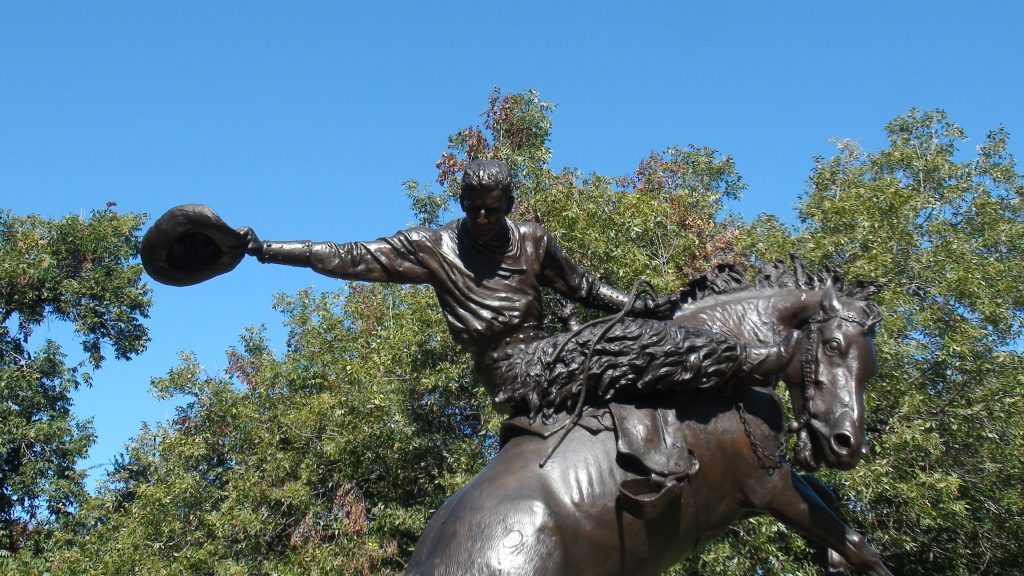Close up of Yee Haw!
Sunday, 15 May 2022
whom our fathers would not obey, but rejected. And in their hearts they turned back to Egypt, Acts 7:39
Note: You can listen to today’s commentary courtesy of our friends at “Bible in Ten” podcast. (Click Here to listen)
You can also read this commentary, with music, courtesy of our friends at “Discern the Bible” on YouTube. (Click Here to listen), or at Rumble (Click Here to listen).
Stephen is still referring to Moses. He just noted that it was he to whom the Angel spoke on Mount Sinai, having received the living oracles which were then given to the people. Now he says of him, “whom our fathers would not obey.”
In the Greek, the word “obey” is an adjective. It should be rendered, “to whom our fathers were not willing to become obedient.” Obedience to Moses is to obey the Lord who gave the law through Moses. But they were unwilling to be obedient, as Stephen says, “but rejected.”
The specific events by which they rejected obedience to Moses, and of which Stephen is referring to, will be detailed in the coming verses. They are centered on what occurred in Exodus 32 in the incident of the golden calf.
For now, there is a casting off of what the Lord commanded. In this, they have cast off obedience to Moses who was chosen by the Lord to lead them. In rejecting this leadership, Stephen next says, “And in their hearts they turned back to Egypt.”
This is something that is specifically recorded in both Exodus 16 and Numbers 14. For example, in Exodus 16, it says –
“Then the whole congregation of the children of Israel complained against Moses and Aaron in the wilderness. 3 And the children of Israel said to them, ‘Oh, that we had died by the hand of the Lord in the land of Egypt, when we sat by the pots of meat and when we ate bread to the full! For you have brought us out into this wilderness to kill this whole assembly with hunger.’” Exodus 16:2, 3
Even though not explicitly stated in Exodus 32, the same attitude is seen there. They rejected the Lord whose presence was seen atop the mountain, and they rejected Moses who was there conferring with the Lord. Instead, they turned their hearts back to Egypt in the sense that they longed for a physical, tangible idol that they could worship.
Life application: Israel turned its heart back to Egypt when they faced lack, such as in Exodus 16. The people turned their heart back to Egypt when they faced the idea of entering Canaan and having to deal with the inhabitants there that had fortified cities and strong defenses as in Numbers 14. They turned their heart back to Egypt in desiring gods that are not God as in Exodus 32. Each of these incidents demonstrates a lack in the people. That lack is faith.
They did not have faith that the Lord would provide for their physical needs, they did not have faith that the Lord would go before them and defeat their foes, and they lacked faith in God if they could not see Him right there among them.
People would rather trust a deaf and mute idol that they have fashioned with their own hands than to trust the unseen God who created all things. We must rise above this type of thinking and trust God through hardship and ease, through victory and possible defeat, and in not seeing the One who has made all that we see.
If we can just remember that He is there and that He has a plan that is being worked out for our ultimate benefit, then the temporary trials can be put in their proper perspective. There is no guarantee of living a life without pains, sadness, or loss. In fact, we should expect all of these things. But we can know that what we experience is temporary and will have a good end in the restoration of all things that God, who cannot lie, has promised to His people. Have faith in this.
Lord God, You are looking for faith in Your faithless creatures. Help us to be people of faith even when it seems beyond our ability to control anything around us. While the whirlwind swirls and destroys, may we remember that the calm and tranquil joy of heaven awaits us because of our hope in Jesus Christ our Lord. Amen.

